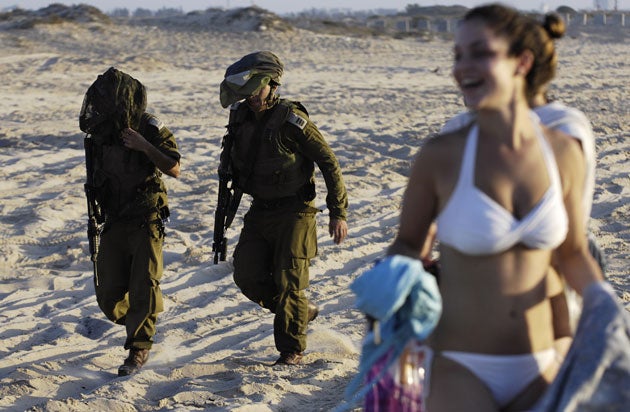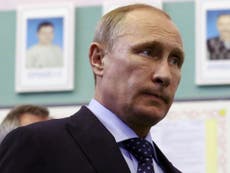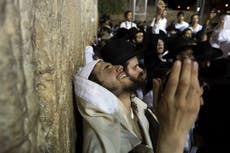The Independent's journalism is supported by our readers. When you purchase through links on our site, we may earn commission.
Between the wars in Israel, spending time in a kibbutz was about as cool as you could get
You have to go to Israel in order to understand its siege mentality


I imagine mine was just about the last generation of non-Jews to regard a sojourn on an Israeli kibbutz as a cool way to spend some months of what was not yet termed the gap year.
My kibbutz experience fell in 1971, between the Six Day War and the Yom Kippur War. The beleaguered condition of Israel was brought home to us very soon after arriving, when we saw tracer fire rising into the night sky above the Dead Sea and thousands of Israeli army conscripts hitch-hiking on the roads.
The tiny size of the country was another fact quickly digested; one that brought home its extreme vulnerability to attack. The rights and wrongs of the Israel-Palestine conflict were already hotly debated. Gaza was already a hell hole. The West Bank was already occupied. But the Israeli point of view was more compelling back then.
On my kibbutz, Kibbutz Malkiyya, which sat right on the border fence with Lebanon in northern Galilee, many of the kibbutzniks were central European refugees, several were Holocaust survivors. This was kibbutz communism neat and strong, with no private property, no wages, children brought up in common, clothes issued from a common store. There was righteousness and courage and the pioneering spirit.
One evening Palestinian guerrillas came over the fence – luckily for us we were all in the air raid shelter that once a week did service as a cinema, happily watching Barbarella – and a number were killed in the ensuing firefight.
That brought the vulnerability of the place home to us. The desperation of those whom the kibbutz guards had killed, who had been crazy enough to come over the fence, was very much a secondary matter. Likewise, the plight of the impoverished Palestinian farmers down the road was barely mentioned.
The principal fact was that the Jews had finally got their homeland and they were battling to hang on to it, and they deserved the outside world’s support in that.
I reminisced about these kibbutz experiences with Jewish friends in London the other day. The kibbutzim are not what they once were, most having “sold out”, as we would have put it in those days. But then nothing is as it was. And seeing both points of view about the Israel-Palestinian conflict is no longer sustainable.
Too much innocent blood has been spilled in Gaza, this time around like last time. Benjamin Netanyahu makes it all very much worse with his grotesque language about “telegenic Palestinian dead”.
The disparity of wealth and strength and resources between the two sides, which has always been extreme, is more appalling than ever. The discussion with Jewish friends begins and ends with pleasant memories of Mount Hermon glimpsed above the clouds and the grapefruit groves in the early morning 40 years ago. Try bringing the conversation into the present and it quickly becomes advisable to talk about something else.
But for our children silence is not an option. They haven’t been to Israel, haven’t seen for themselves how tiny and vulnerable it is, that you can travel from north to south in a few hours. Nor have they listened receptively, as we did once upon a time, to the Zionist foundation story.
All they see is an extremely prosperous, nuclear-armed settler state, practicing a form of apartheid as bad as or worse than South Africa’s was, enjoying the unstinting support, financial, diplomatic and otherwise, of the West, and wreaking unbelievable misery on its impoverished aborigines. There is nothing more starkly black and white in the world than the way the Gaza conflict has played out in the media during these hellish weeks.
So now Europe is aflame with protests. Dan Bilefsky, of The New York Times, reports anti-Israel protests erupting in “dozens of cities in Europe, as thousands of pro-Palestine protesters have depicted Israel as the aggressor and sought to isolate it internationally”. And increasingly the taboo we were once keenly aware of – that of confusing “Israeli” with “Jewish” and of letting anti-Israel protests leach into attacks, verbal or otherwise, on Jewish targets – is being trampled on.
Part of this is plain ignorance. A great deal of it is down to the rise of neo-fascism and neo-Nazism across the Continent in recent years. Some, I have no doubt, is down to militant Islamists of the Isis variety, for whom Jews are just as legitimate a target – of extermination, if possible – as Shias, Christians, Sufis… And this time around, social media have done their usual catalysing work.
On Twitter, the hashtags #Hitlerwasright and #Hitlerdidnothingwrong have been trending. And as a result there are also the warm-hearted young leftists, climbing aboard this terrible bandwagon. Some of their leaders are bright enough to be embarrassed by it.
A leader of Germany’s Left Party, describing a protest by the party’s youth group in Essen, reported, “The Essen Synagogue was a proclaimed target of anti-Israeli participants at this demonstration. Bottles and stones were thrown at pro-Israeli demonstrators. I am deeply ashamed.”
As a result of all this, as well as of the heart-rending images of death in Gaza, the virus of anti-Semitism has burst the bounds of the different ghettoes, religious and political, where it has been deliberately cultivated for years, and risks becoming widely received and casually retailed as it has not been since the discovery of the Nazi death camps. How on earth can this return to the evil past be halted?



